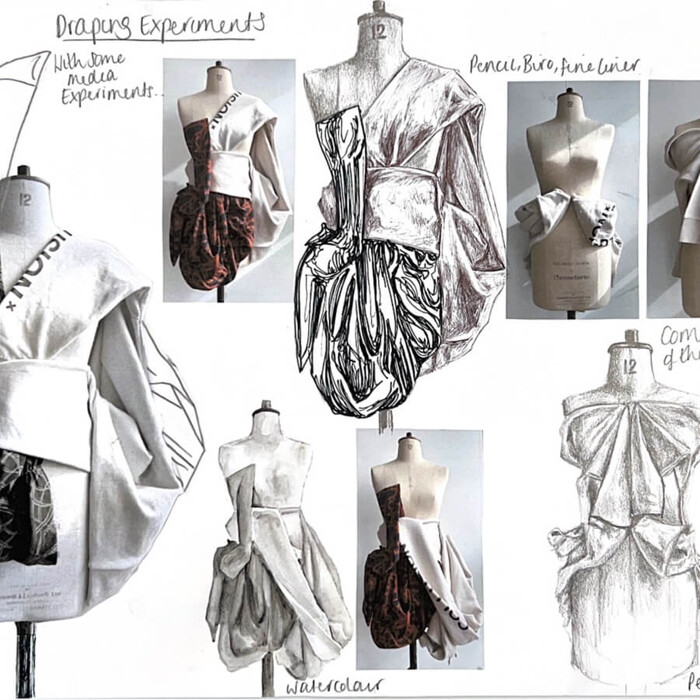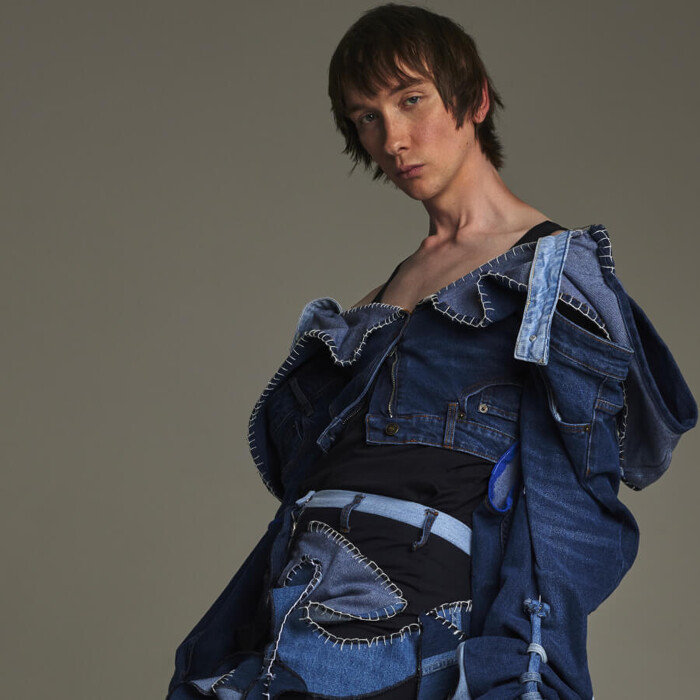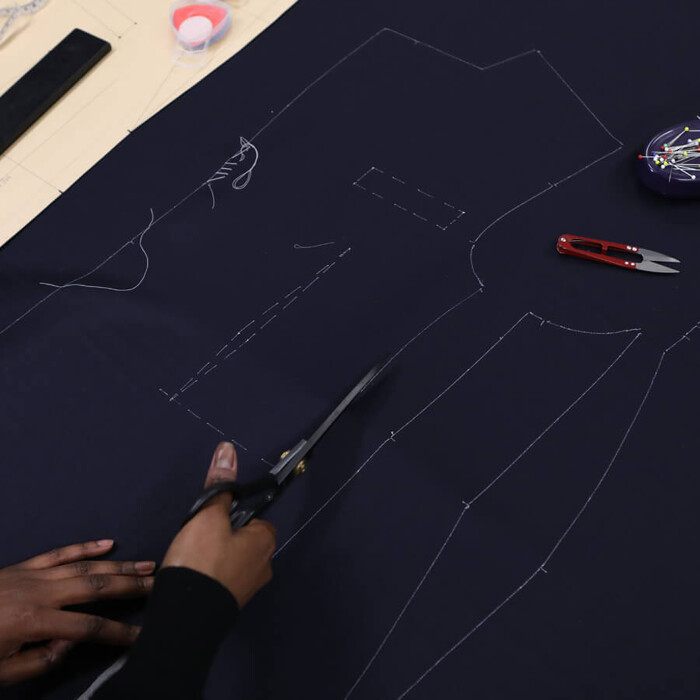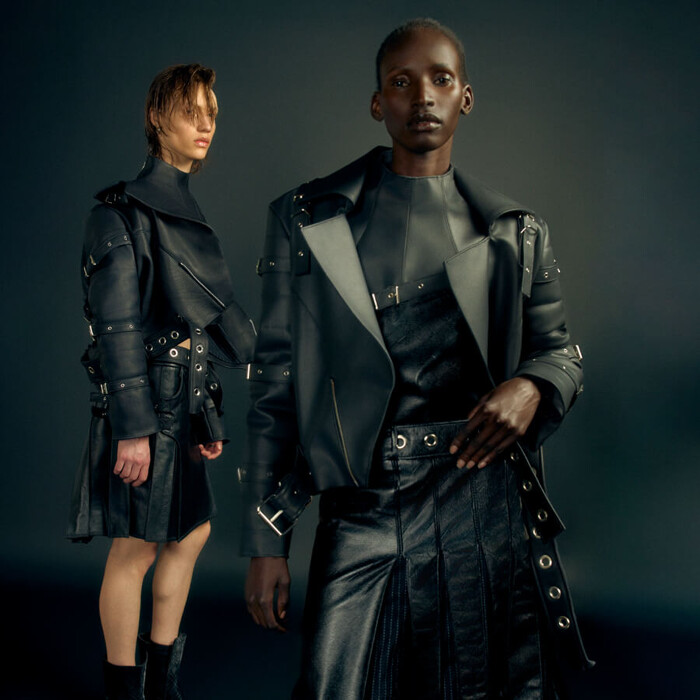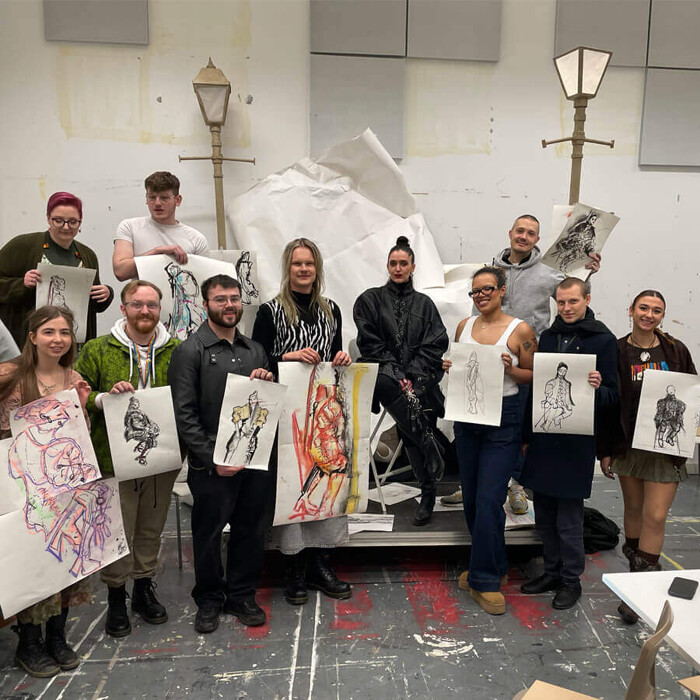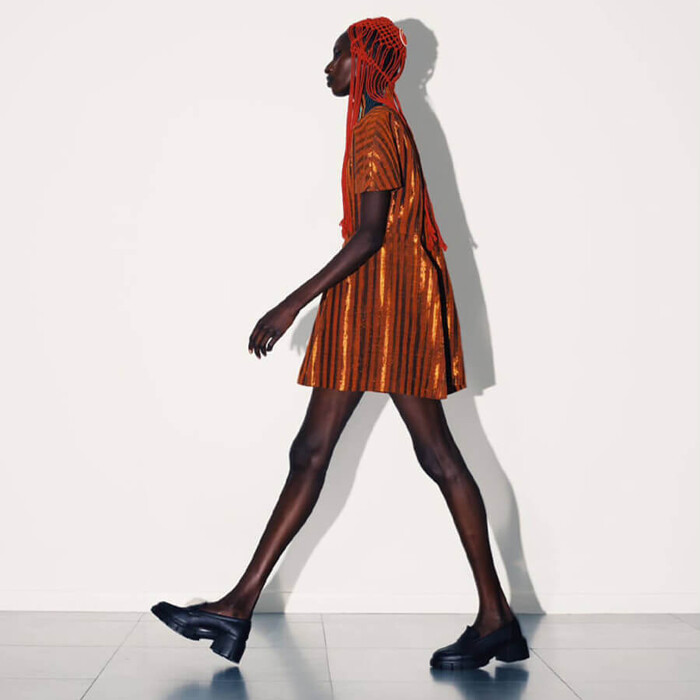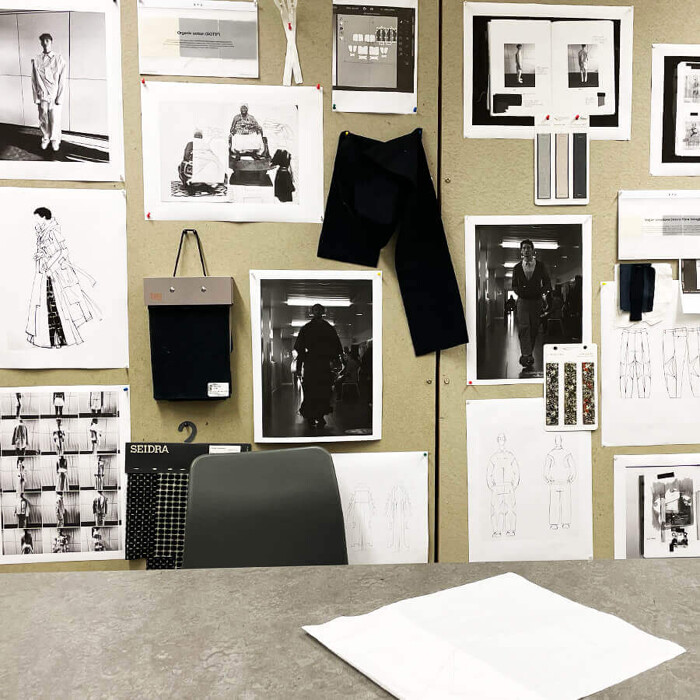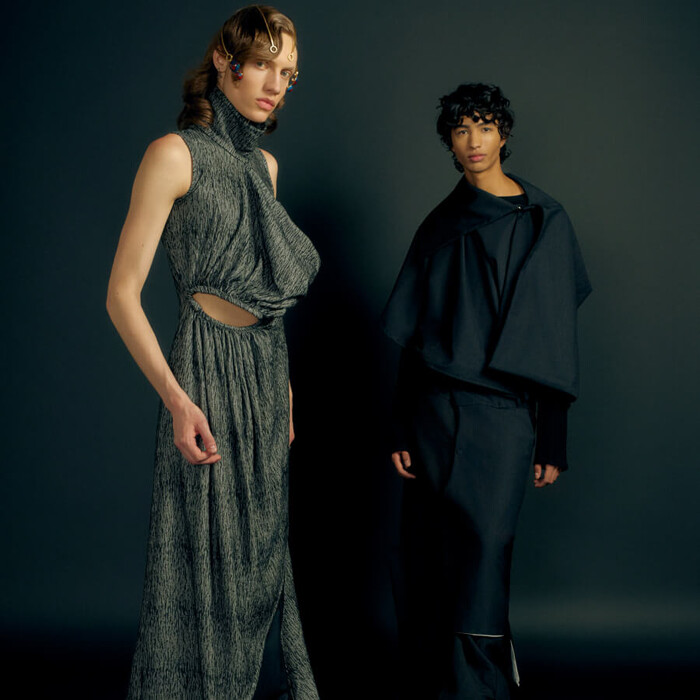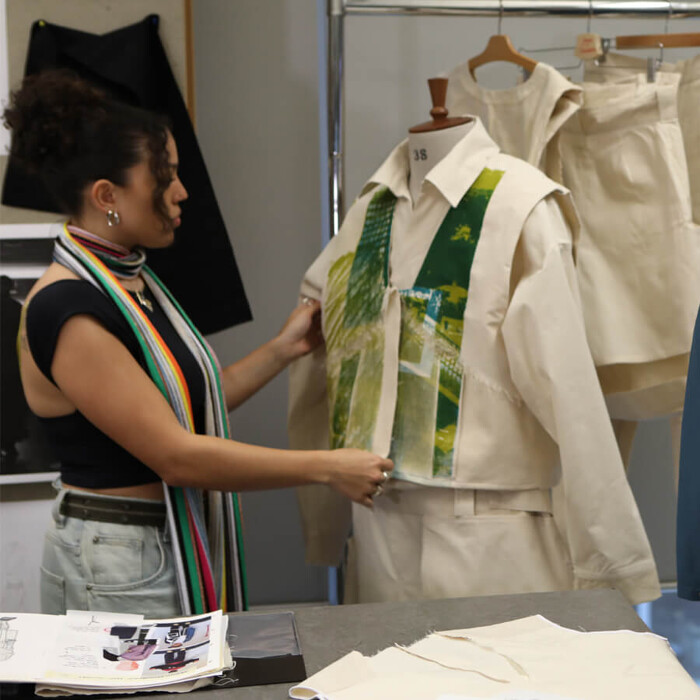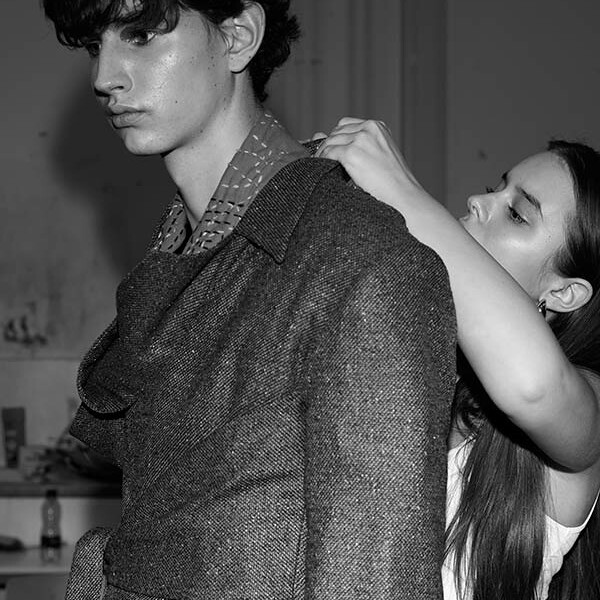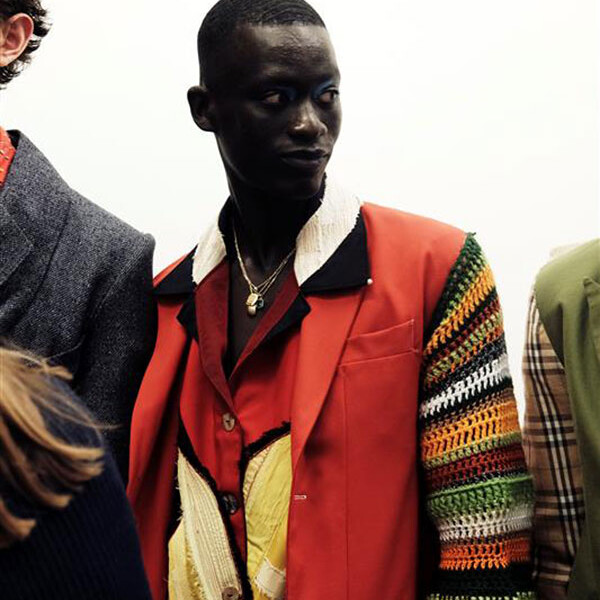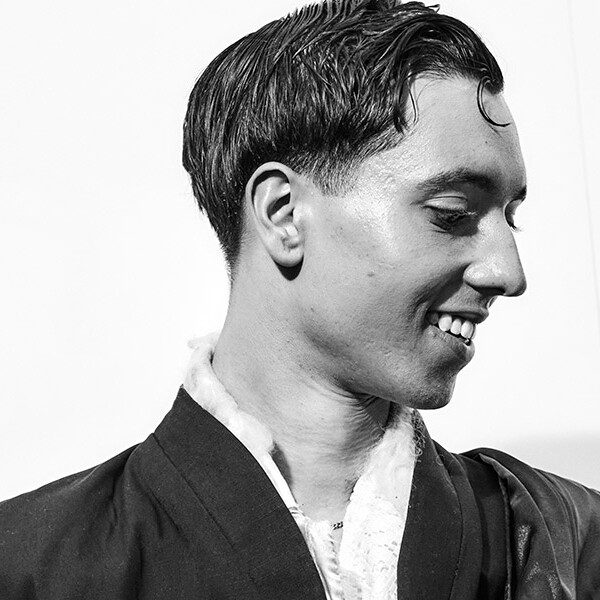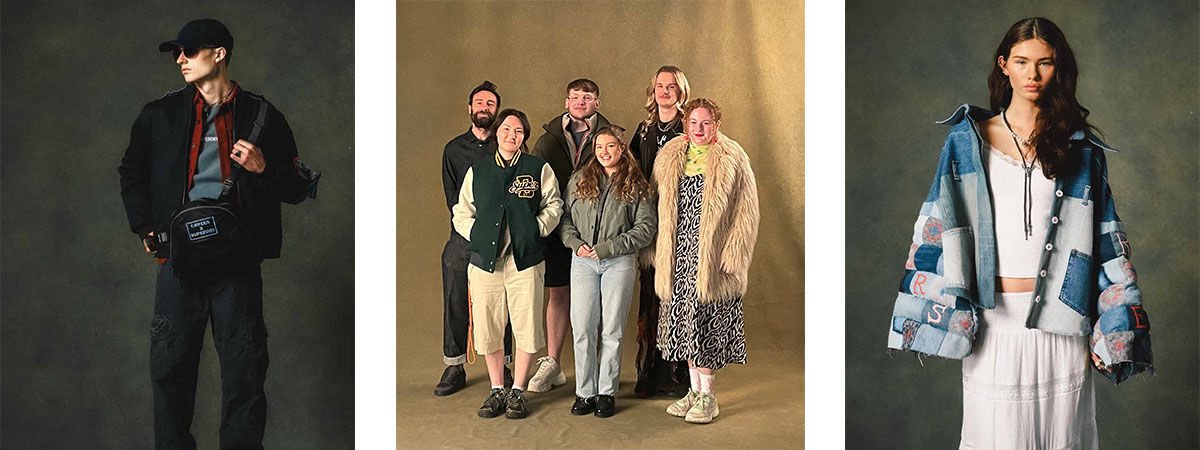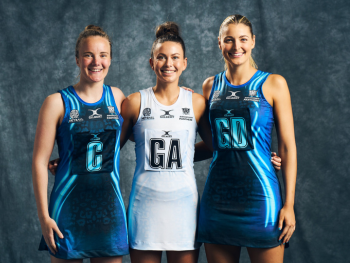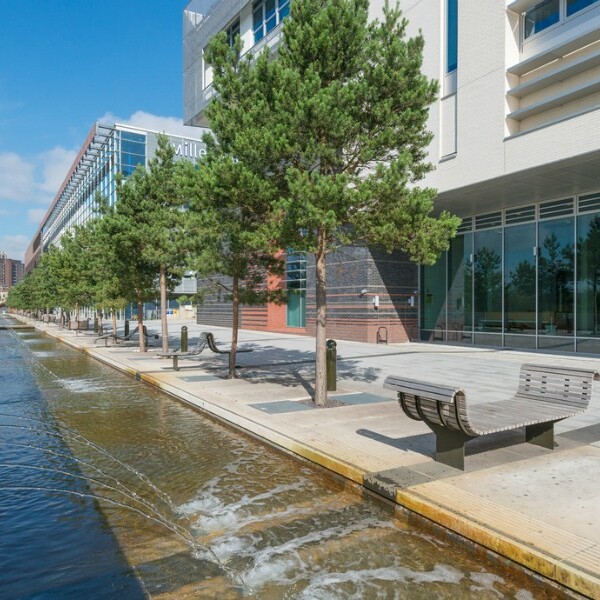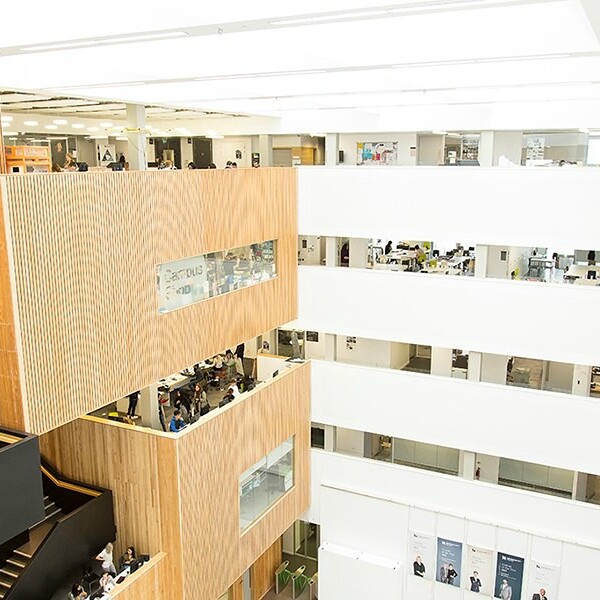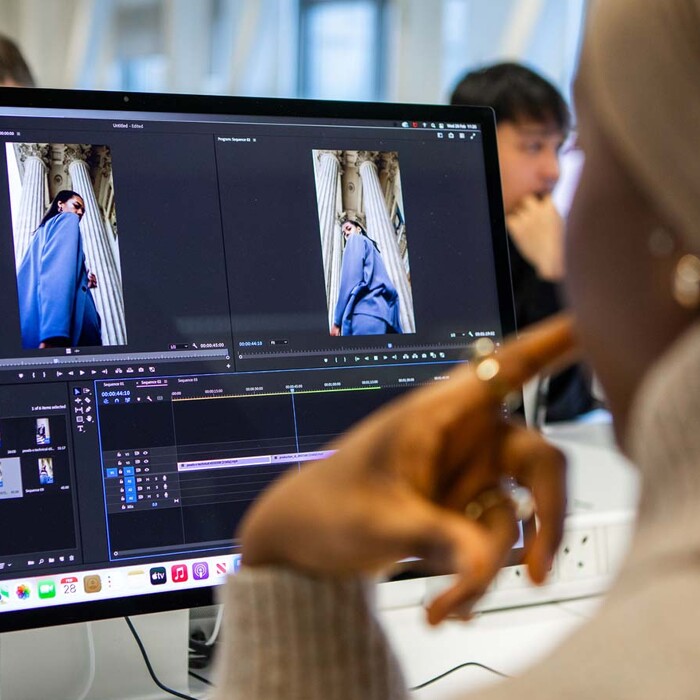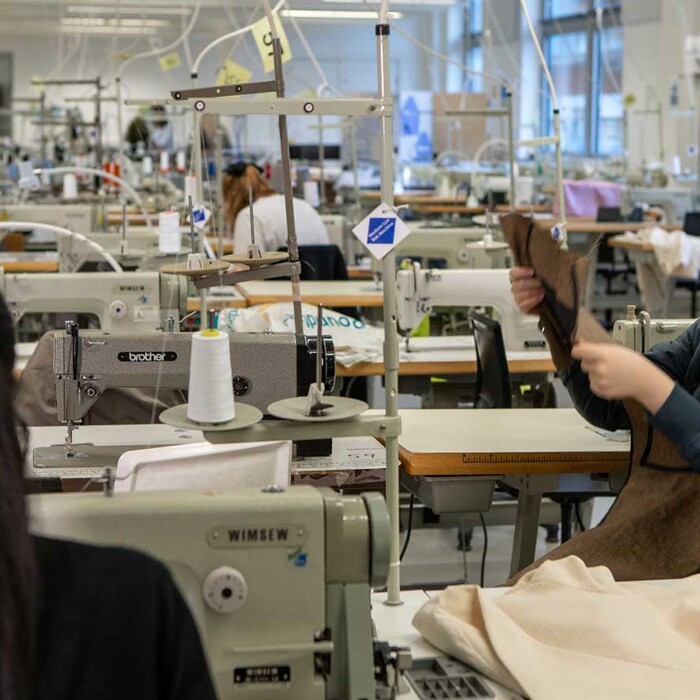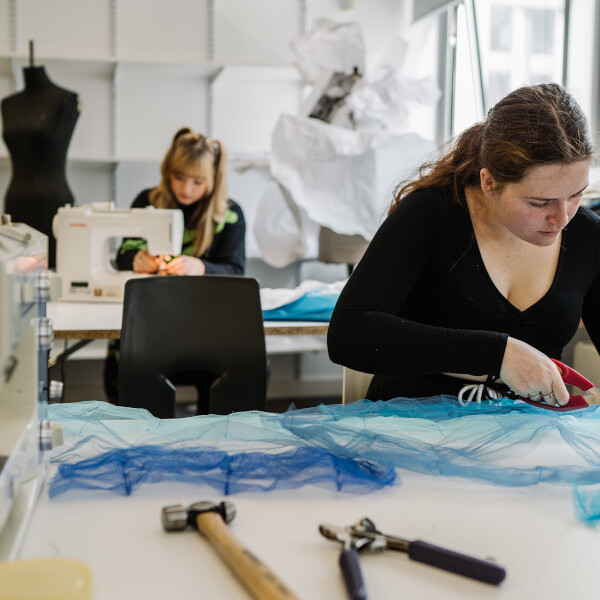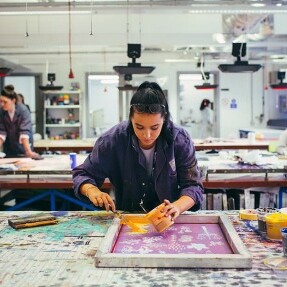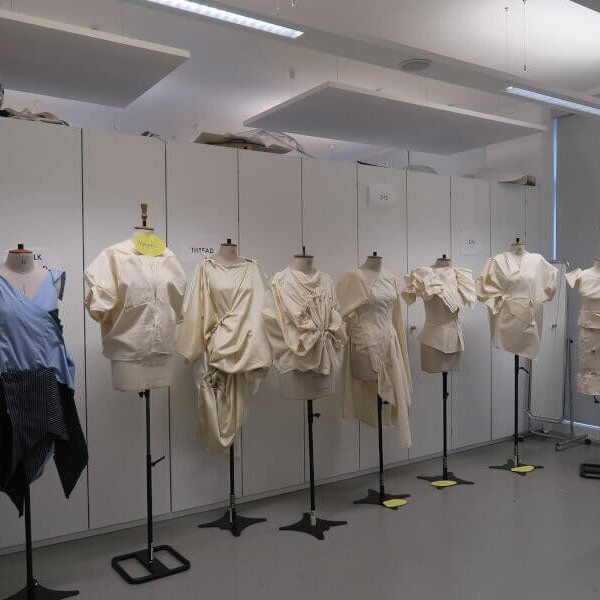
Fashion Design - BA (Hons)
Currently viewing course to start in 2025/26 Entry.
Our BA Fashion Design Course will provide you with a comprehensive fashion design education. The course encourages innovation in both design skills and technical craftsmanship with a focus on sustainability, system thinking and socioeconomic practice....
- Level Undergraduate
- Study mode Full Time
- Award BA (Hons)
- Start date September 2025
- Fees View course fees
- Subject
- Location City Centre
This course is:
Available with Professional Placement year
Open to International Students
Overview
Our BA Fashion Design Course will provide you with a comprehensive fashion design education. The course encourages innovation in both design skills and technical craftsmanship with a focus on sustainability, system thinking and socioeconomic practice. We will provide you with international opportunities and integration with our industry partners to empower you to explore your individuality, creativity, and future employability.
You will work with industry experts and a dedicated team of academic researchers and practitioners. A decolonised curriculum structures the innovative approach to 2D and 3D design resulting in diverse experts of your craft.
Within your first year of study, you will explore pure fashion design skills through a fundamental grounding in garment knowledge, construction, materiality, fabric and fibres analysis, tailoring and drape delivered in an atelier environment. In your second year you will discover systems thinking in relationship to Fashion design and our course’s structure will allow you to strategically balance between physically traditional and virtually digital craftmanship. Your final year of study provides you with the opportunity to express your individual design methodology in one of many creative formats, including a collection of garments, fashion products, material research and digital design technology.
We will guide you with the decision of taking a placement year between your second and final year of study. Our dedicated internal careers team will support you through this process. We are proud that our recent cohorts have taken year placements with renowned designers such Paul Smith, Christopher Kane and Craig Green as well as industry super brands such as Superdry, NEXT and Adidas. We let you choose your design identity and tread your own design path.
Our Fashion Design Course has built a reputation for students entering the industry as original, creative, independent thinking employable designers. Our award-winning graduate portfolios and fashion collections are showcased on international, digital, and local west-midland based platforms. You will study on a programme that is specifically designed to produce job-ready graduates with transferrable skills that can form and reshape our industries.
What's covered in this course?
The course equips you with the necessary knowledge, skills and attributes to succeed in a wide range of careers in the fashion industry.
Your first year will introduce you to a number of fashion topics, helping you to develop a good foundation of fashion knowledge and skills, in both design and technical areas.
Your second year helps to strengthen your personal and professional development in relation to your own career goals. You will also have the opportunity to study abroad during this year.
An optional placement year takes place between years 2 and 3, providing an opportunity for an internship in industry.
Your final year, gives you the opportunity to specialise in women’s or menswear. You will focus on your own individual area of practice and produce garments that reflect your personal direction as a creative fashion design graduate.
The course blends individual creativity and commercial realism, and you will be able to apply your skills and knowledge of the professional design process, from concept to product.
Professional Placement Year
This course offers an optional professional placement year. This allows you to spend a whole year with an employer, following successful completion of your second year, and is a great way to find out more about your chosen career. Some students even return to the same employers after completing their studies.
If you choose to pursue a placement year, you will need to find a suitable placement to complement your chosen area of study. You will be able to draw on the University’s extensive network of local, regional, and national employers, and the support of our Careers teams. If you are able to secure a placement, you can request to be transferred to the placement version of the course.
Please note that fees are payable during your placement year, equivalent to 20% of the total full-time course fee for that year.
My time at BCU has been amazing. My favourite part of my uni experience was my Final Major Project which I got to express myself and network with lots of people and industry. The university has supported me through my degree and I wouldn’t have been able to get my degree and achieve my best without them.
Rachel Hunt-Pearce
Why Choose Us?
- You will have opportunities to take part in exciting social events and competitions with industry giants and leading retail businesses such as Freetrain and Harvey Nichols, which will help you secure professional experience and gain important commercial awareness.
- We have excellent links with regional and international brands such as Burberry, John Lewis, SuperDry and Rab, which give the course colour and contemporary relevance.
- You can enjoy a vast archive of fashion publications dating back to the 1930s and develop digital skills within Adobe Illustrator, Photoshop and Clo 3D, essential industry tools within the global fashion industry.
- You will have the chance to showcase your final year work to industry leaders looking for talent at national and regional events.
- We provide excellent international opportunities such as our students being able to attend New York Fashion Week and collaborating with global brands like Turtlehorn.
Open Days
Join us for an Open Day where you'll be able to learn about this course in detail, chat to students, explore our campus and tour accommodation. Booking isn't open for this event yet, register your interest and we'll let you know as soon as booking goes live.
Next Open Day: 28 June 2025
Entry Requirements
These entry requirements apply for entry in 2025/26.
All required qualifications/grades must have been achieved and evidenced at the earliest opportunity after accepting an offer to help confirm admission and allow for on-time enrolment. This can also include other requirements, like a fee status form and relevant documents. Applicants can track their application and outstanding information requests through their BCU mySRS account.
Essential requirements
- Standard offer: 112 UCAS Tariff points. Learn more about UCAS Tariff points.
- Accelerate offer: 80 UCAS Tariff points. Find out more about BCU Accelerate.
Applicants will also need to submit a good portfolio.
If you have a qualification that is not listed, please contact us.
Don’t meet our entry requirements?
You could apply for a foundation course or a course at our International College. These routes have lower entry requirements and act as the bridge to a full degree. To find out more, please select your status:
Fees & How to Apply
UK students
Annual and modular tuition fees shown are applicable to the first year of study. The University reserves the right to increase fees for subsequent years of study in line with increases in inflation (capped at 5%) or to reflect changes in Government funding policies or changes agreed by Parliament. View fees for continuing students.
Award: BA (Hons)
Starting: Sep 2025
- Mode
- Duration
- Fees
- Full Time
- 3 years
- £9,535 in 2025/26 ✱ Important note for this price
- Apply via UCAS
(↩Back to price) * The Government is proposing to increase the cap on full-time regulated tuition fees to £9,535 for 2025/26 and the University is planning on increasing fees to that maximum level once legislation is enacted. Part-time fees are charged pro-rata, where applicable.
International students
Annual and modular tuition fees shown are applicable to the first year of study. The University reserves the right to increase fees for subsequent years of study in line with increases in inflation (capped at 5%) or to reflect changes in Government funding policies or changes agreed by Parliament. View fees for continuing students.
Award: BA (Hons)
Starting: Sep 2025
- Mode
- Duration
- Fees
- Full Time
- 3 years
- £17,690 in 2025/26
Guidance for UK students
UK students applying for most undergraduate degree courses in the UK will need to apply through UCAS.
The Universities and Colleges Admissions Service (UCAS) is a UK organisation responsible for managing applications to university and college.
Applying through UCAS
- Register with UCAS
- Login to UCAS and complete your details
- Select your course and write a personal statement
- Get a reference
- Pay your application fee and submit your application
Guidance for International students
There are three ways to apply:
1) Direct to the University
You will need to complete our International Application Form and Equal Opportunities Form, and submit them together with scan copies of your original academic transcripts and certificates.
2) Through a country representative
Our in-country representatives can help you make your application and apply for a visa. They can also offer advice on travel, living in the UK and studying abroad.
3) Through UCAS
If you are applying for an undergraduate degree or a Higher National Diploma (HND), you can apply through the UK’s Universities and Colleges Admissions Service (UCAS).
You can request a printed form from your school or nearest British Council office. You will be charged for applying through UCAS. Birmingham City University’s UCAS code is B25 BCITY.
Portfolio guidance
If you receive an offer to study this course, you will be required to submit a portfolio. We ask that this is submitted within four weeks of receiving your offer.
Please see our portfolio guidance page for tips on putting your portfolio together.
Portfolio guidance
If you receive an offer to study this course, you will be required to submit a portfolio. We ask that this is submitted within four weeks of receiving your offer.
Please see our portfolio guidance page for tips on putting your portfolio together.
Personal statement
UK / EU students are required to submit a personal statement as part of their application for this course.*
The personal statement gives you a crucial opportunity to say why you’re applying and why the institution should accept you.
Here are the key areas you’ll need to address:
- Course choice - Why does this course appeal? What areas are of particular interest?
- Career plans - If you have a specific career in mind, say how your chosen course will help you pursue this goal.
- Work experience - Mention any work that is relevant to your subject, highlighting the skills and experience gained.
- School or college experience - Highlight skills gained at school/college, eg summer schools or mentoring activities.
- Non-accredited skills or achievement - eg Duke of Edinburgh Award, Young Enterprise scheme.
You should also mention your future plans – if you’re planning to take a year out, don't forget to give your reasons. Talk about any subjects you’re studying that don’t have a formal assessment and any sponsorships or placements you’ve applied for. And don't be scared to add in details about your social, sports or leisure interests.
Worried about Personal Statements?
If you've got no idea where to start or just want to check you're on the right track, we’ve got expert advice and real examples from our students to help you nail your personal statement. You can even download our ultimate personal statement guide for free.
*Non-EU students are not required to submit a personal statement when applying for this course.

Financial Support
We offer further information on possible undergraduate financial support. This includes the type of loans, grants and scholarships available both from the government and from Birmingham City University.
Course in Depth
Year one
In your first year you are introduced to a broad range of fashion studies theory and technical skills, building a sound base for further study in years two and three.
You will learn design skills such as CAD, live fashion drawing, fashion illustration, fashion flats, styling and photoshoots. Alongside this, you will gain theoretical skills, such as contextual studies in fashion and related art and design.
You will also gain the skills that you need to solve practical problems and create presentations.
In order to complete this course you must successfully complete all the following CORE modules (totalling 120 credits):
In this module you will explore the connections between the creative fashion and textile industries in the past, and how this informs present and future trends. You will be introduced to the way individuals have influenced culture, freedom of expression and experimentation, and how this pushes boundaries and explores identity.
Through reflection you will analyse your research and the connections that you discover, developing core skills and communicating your findings and ideas through the use of industry-standard software.
Shared content is delivered via blended learning, this is underpinned by your course-specific content which is delivered on campus.
During this module you will unleash your creativity and explore the vibrant role of fashion designer. You will undertake a multidisciplinary journey where you will craft and design garments with the intent to hone and develop your own set of specialist skills to inform your artistic vision. You will be tasked to create original concepts and to play with 2D and 3D forms, sourcing fabrics, and sketching mixed media illustrations.
The Fashion design technology module will require you to explore the rich heritage of traditional flat pattern cutting techniques, guided by seasoned pattern cutting experts. Engage in a dynamic series of introductory workshops and seminars that will take you from the art of drafting patterns to the construction of physical toiles. You will acquire core skills in flat pattern cutting, draping, stand manipulation, and the cutting-edge Lectra technology processes. You will develop a solid foundation in pattern cutting that is crucial for becoming a well-rounded fashion designer.
You will be introduced to systems thinking to create designs that not only look incredible but also make a statement and drive an impact for change. Connect the dots between conceptual design and garment functionality to understand the bigger role of fashion designer and the Fashion supply chain. You will be encouraged to explore the fashion archives, delve into historical garments, research contemporary fashion designers and current global trends to shape your innovative design approach.
AI Integration will form part of your approach to problem-Solving: To kickstart the creative process, you will design something using AI on the first day of the module. You will receive a half-designed technical drawing and be tasked with solving a problem, sparking innovative thinking from the outset. Workshops, skill seminars, and technical sessions will then empower you to develop samples that will be included in your rudimentary design pack.
Year two
In your second year, you will develop more advanced research, design development, presentation and technical skills, with a view to gaining work experience that will enhance your skills and employability upon graduation.
In order to complete this course you must successfully complete all the following CORE modules (totalling 100 credits):
This level 5 undergraduate module is designed to equip students with the essential skills and knowledge necessary for a successful transition into the industry work placement and beyond. The module focuses on cultivating a deep understanding of professional practices, industry expectations, and personal development strategies.
Through a combination of theoretical knowledge, practical exercises, case studies, and industry guest lectures, this module provides students with a solid foundation for their future careers empowering them to thrive in a competitive and dynamic industry landscape.
Tailoring serves as the backbone for honing your understanding of form and silhouette manipulation.
You will learn traditional bespoke techniques from menswear tailoring such as padding, pitch, fit, function, hand and pad stitch, moulding and building shape into fabric, and sewing and pressing techniques. These traditional technical skills will serve as tools for your artistic innovation. They will enable you to not only meet industry standards but also push creative boundaries. Traditional tailoring techniques are not just methods; they become the language through which your unique design voice will be articulated.
In this experimental fashion design module, you will aim to create a body of work that will form the essential skills and knowledge needed to create a work placement portfolio that showcases your creativity but also reflects a commitment to sustainability and ethical practices. The focus will be on merging cutting-edge digital design skills, advanced technical expertise, an understanding of fabric properties, and a thoughtful approach to design that minimises environmental impact and engages with a community output.
In order to complete this course you must successfully complete at least 20 credits from the following list of OPTIONAL modules.
The purpose of the work placement module is to enable you to develop professional attributes and subject skills through experience in the work place, and to critically reflect upon your learning in that context. You will normally be expected to arrange your own placement, with support from academic staff and BCU Careers.
This module provides an opportunity for you to apply your knowledge and skills to an external, professional brief. The brief will be set by or in discussion with an external client/agency/community and could be a ‘real life’ problem to be solved, or a simulation. The resulting project should consider sustainability and address relevant UN Sustainable Development Goals as a key aspect of contemporary creative industries work. The module provides an opportunity for you to engage in a responsive, imaginative and professional manner with an aspect of your subject area, which contributes to the development of employability skills within the supportive infrastructure of the University. You will collaborate with students, and where relevant with other stakeholders, and will be supported to approach the project with curiosity, openness, critical thinking, innovation and practical and technical skills, in order to produce project outcomes and/or solutions which meet the required brief.
Creative careers can take people to a wide variety of, sometimes, unexpected destinations. Learning to see and exploit opportunities can be the key to a rewarding portfolio career making good use of your creative skills whilst earning a living from doing what you love, whether it's producing creative artefacts, performing, offering a service or consultancy. Learning to promote and ‘pitch’ those ideas to others is core to developing a successful independent, creative and entrepreneurial career. This module will build your skillset to enable you to talk confidently about you and your work. It will also help you to find or create opportunities, some may even come as a surprise to you!
Core modules are guaranteed to run. Optional modules will vary from year to year and the published list is indicative only.
Professional Placement Year (Optional)
In order to qualify for the award of BA (Hons) Fashion Design with Professional Placement Year a student must successfully complete the following module.
Professional Placement Year 120 credits
Year three
In order to complete this course you must successfully complete all the following CORE modules (totalling 120 credits):
This Level 6 undergraduate module is designed to further develop your research and inquiry skills within the context of the fashion and textile industry.
You will undertake a range of research methods on a topic of personal interest. You will investigate and critically analyse the findings. You will be applying a reflective comment to the evidence to deepen your understanding of your field and considering real-world challenges in the industry.
You will present conclusions and recommendations in a proposal that feed into an independent project.
Your pre-collection module will ask you to focus your previous learning and provide you, the designer, with the opportunity to unleash your creativity, implement your acquired technical skills, and showcase a personalised design methodology that reflects your unique perspective. The module emphasises negotiation with your tutor to explore diverse outcomes in the realms of digital design, material selection, and garment creation, fostering an environment where your ideas flourish and push the boundaries of conventional fashion.
During your Collection Construction Module, you will embark on an advanced journey, seamlessly integrating your accumulated design knowledge into the meticulous construction of a signature collection and or body of negotiated work. You will be required to refine your design methodologies through close collaboration and negotiation with tutors, ensuring that creative visions align with industry standards, and sustainable ethical practice. You will be required to document the fit, form, silhouette, and function of your garments, as you reflect on the development during construction of your collection and how those garments interact with the human and/or 3D forms.
You will immerse yourself in a comprehensive exploration of your creative abilities, culminating in a multifaceted showcase of your skills. You will have the opportunity to direct and create your own Lookbook photoshoot, where you conceptualise and execute a visually compelling documentation of your previous collection outcomes, Recording your proficiency in design, styling, and storytelling. Additionally, emphasis is placed on the art of presentation and curation, where you learn to articulate your design concepts effectively and curate a cohesive narrative during an internal platform or external showcase. You will refine your communication skills and enhances your ability to engage new audiences with your work.
Download course specification
Download nowThis course is ideal if you intend to pursue a creative career in fashion design and related industries. Our previous graduates work within companies including H&M, Victoria Beckham, Marks & Spencer and Erdem, as well as many other international brands.
Within the first year you will be introduced to the fundamental skills needed to work within the fashion industry including fashion theory, commercial and conceptual design, trend research and garment development.
During your second year, you will develop these skills to a more focused and advanced level, before applying for work experience within your chosen sector of the industry, with the option of a professional placement year between the second and third years of study.
In your final year, you will design and produce a collection of garments plus associated portfolio work for your major project, with a focus on either the menswear or womenswear market sectors.
Discover the community in the College of Jewellery, Fashion and Textiles where our students talk about their journeys here at BCU which has inspired creativity and innovation.
Fashion Design Students Win Superdry Competition
BA Fashion Design students recently undertook the Superdry X BCU Sustainable Design Project on a sustainability-focused design competition. Emily reveals the creative process behind her denim garment, and highlights the experience of working on a live industry brief with Superdry.
Fashion Design students design kit for Birmingham’s first Netball Superleague team
Birmingham’s first-ever Netball Superleague team have unveiled their new kit – and it’s been designed by two talented students from Birmingham City University’s (BCU) College of Fashion and Textiles.
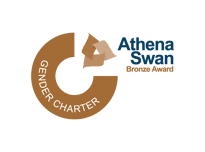
Athena Swan Bronze Award
Our Jewellery, Fashion and Textiles courses have been awarded the Athena Swan Bronze Award for our commitment to Equality, Diversity and Inclusion (EDI).
Athena SWAN is a quality charter mark framework and accreditation scheme established and managed by the UK Equality Challenge Unit in 2005 that recognises and celebrates good practices in higher education and research institutions towards the advancement of gender equality: representation, progression and success.
Employability
The course is ideal if you intend to pursue a creative career in fashion design and related industries. Throughout the degree, you will develop the fundamental skills needed to work within the fashion industry, equipping you with the necessary knowledge, skills and attributes to succeed in your creative practice.
You will have the opportunity to apply for work experience in your chosen sector of the industry during your second year, with the option of a professional placement year between the second and third years of study. On successful completion, you will graduate with a portfolio-based final outcome relevant to your individual career aspirations.
Graduate jobs
Graduates from our course progress to gain jobs within many of the major high end and high street companies, both within the UK and overseas. You’ll find Birmingham City University alumni working in Adidas, Marks & Spencer, Erdem and Victoria Beckham.
As well as womenswear and menswear designers, the BA (Hons) Fashion Design can also allow you to find employment as the following: accessories designer, art director, academics and teachers, activewear designer, brand managers, buyer, content creator, curator, childrenswear designers, costume designer, 3D designer, denim designer, digital operations, data analyst/insights, display designer, e-comms developer, fabric buyer/developer, factory sourcing, graders (pattern), homeware designer, influencer/talent management, interiors for retail, jewellery designer, knitwear technician, lingerie/intimates designer, merchandiser and digital designer.
Destinations:
- Paul Smith
- Reiss
- Ted Baker
- WGSN
- J.Lindeberg
- H&M
- Adidas
- The V&A
- Gym Shark
- MA Central Saint Martins
- MA Royal College of Art
- MA London College of Fashion
Placements
This course offers an optional professional placement year. This allows you to spend a whole year with an employer, between the second and third year of your degree, and is a great way to find out more about your chosen career. Our students have previously secured placements with major fashion brands including H&M, Next, Amanda Wakeley, Mary Katrantzou and Iris Van Herpen.
Links to industry
The College of Fashion and Textiles works with local, national and international businesses to enhance student learning through placements, workshops, live briefs and guest lectures from industry professionals.
Throughout our course we actively encourage collaboration sponsored and live projects with the fashion industry. We have worked with Paul Smith, Burberry, George and Rab. These collaborations underpin our delivery and add value to the curriculum within the course. Industry links include:
- The British Fashion Council
- The National Trust
- Harvey Nichols
- The Commonwealth Games
- River Island
- Superdry
- The Couture Company
- London Royal Ballet
- Carrier Goods
- Gym Shark
- Hades Knitwear
- Katie Jones
I had the best experience I could have hoped for at BCU, the course has prepared me well for my future in the fashion industry. The wonderful lecturers and technicians supported me throughout my university journey, helping me to achieve my best. Since Graduating I have been doing freelance work for two different brands, and started my own online sustainable clothing and accessories brand.
Florence Cook - Fashion Design Graduate
BCU is the space where I gained confidence in being myself. It provided me with the required support and mentoring that has shaped my skills as a designer. Even though I was an international student the friendly environment helped me become comfortable and later it became a space for cross-pollination of ideas helping me grow as a designer. I went on to develop my interests in sustainability, culture, and object value through design at the Royal College, London.
Uroos Jamal - Fashion Design Graduate
During my time studying fashion at BCU, I was encouraged to work hard and constantly pushed to develop my skills and personal design style. The lecturers worked cohesively to get to know each student and develop their own talents on a one-to-one basis. I was provided with countless opportunities both internally and externally to exhibit my work and acquire new knowledge and a better understanding of the industry.
Marcus Deaville - Fashion Design Graduate
Abigail Buckland
BA (Hons) Fashion Design 2022 graduate
 My time at BCU was incredible. The enriching, creative environment allowed complete freedom to achieve my designs and to form a personal voice. My lecturers were so supportive and attentive to my learning style, making sure that my specific talents were championed and developing areas where I was less confident in a tailored, personal way. The experiences offered to me have shaped my future, including a sandwich year to gain important industry experience. A collaboration with an official brand to understand real-world practices (which lead to my first job in fashion design). The best of all was the development of a final major collection, shown at catwalks in Birmingham and London (and featured by Vogue twice). Overall I left University confident in my technical skills and excited to join the industry I had studied, knowing that the faculty were rooting for me all the way!
My time at BCU was incredible. The enriching, creative environment allowed complete freedom to achieve my designs and to form a personal voice. My lecturers were so supportive and attentive to my learning style, making sure that my specific talents were championed and developing areas where I was less confident in a tailored, personal way. The experiences offered to me have shaped my future, including a sandwich year to gain important industry experience. A collaboration with an official brand to understand real-world practices (which lead to my first job in fashion design). The best of all was the development of a final major collection, shown at catwalks in Birmingham and London (and featured by Vogue twice). Overall I left University confident in my technical skills and excited to join the industry I had studied, knowing that the faculty were rooting for me all the way!
After a 3 month design internship that I won through the BCU X SDX competition, I was offered a job. So I am now an assistant designer at Superdry, focusing on jersey sport men’s and women’s.
Accolades:
- SDX BCU RMX SuperDry Deconstruction Live Brief Winner
- GFW Commended Catwalk Show Collection
- Published in Vogue Netherlands, highlighted as 'one to watch' by Vogue Italia and showcased in Harvey Nicols.
Facilities & Staff

Our Facilities
Fashion and Textiles courses are based at our Parkside Building, which is part of our multi-million pound City Centre Campus development in the heart of Birmingham's Eastside development.
Our staff
Joseph Turvey
Course Leader and Senior Lecturer - BA (Hons) Fashion Design
Joseph Turvey is a British fashion designer known for his eponymous menswear brand, His work has been presented through renowned platforms such as Fashion East, London Fashion Week, Capsule Paris, and Shanghai Fashion Week.
More about JosephSabine Lettmann
Senior Lecturer - BA (Hons) Fashion Design
Sabine started teaching fashion design in 2015. Since then, she teaches diverse fashion design related subjects with an emphasis on sustainability across different fashion programmes in Germany, Denmark and the UK including BA and MA level. She also shares her work through workshops and guest lectures and has been invited to contribute to fashion...
More about SabineSian Riley
Lecturer - BA (Hons) Fashion Design
Sian studied her Bachelor’s degree in Fashion Design Technology: Womenswear from the London College of Fashion, before completing her Master’s degree in Fashion Design and a PGCE in Post-Compulsory Education at Birmingham City University.
More about SianDean Fallon
Senior Lecturer - BA (Hons) Fashion Design
Dean is a full-time Fashion Design Lecturer at BCU and Teaching Fellow of the Higher Education Academy (HEA), with lecturing experience since 2012. Furthermore, Dean’s career outside of teaching spans over a decade, from design roles for High St suppliers and independent labels, to Creative Director of an independent streetwear brand.
More about DeanLucinda Holbrook-Hase
Lecturer - BA (Hons) Fashion Design
Lucinda is a Pattern Cutting Lecturer and Fellow of the Higher Education Academy (HEA) with 7 years lecturing experience in HE. She began teaching fashion design and pattern cutting in 2008 at both further education and vocational education courses.
More about Lucinda